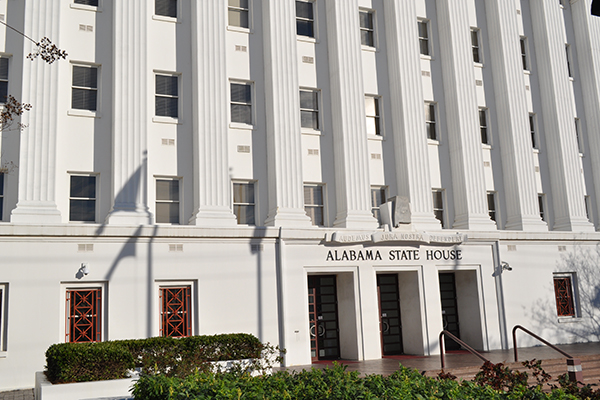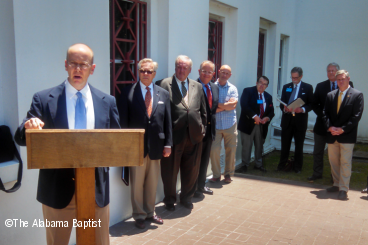By Jennifer Davis Rash and Maggie Walsh
The Alabama Baptist
The game is up for electronic bingo in Alabama.
Two recent rulings by the Alabama Supreme Court, combined with a March 2016 ruling already in the books, officially clarified that electronic bingo in all its forms is illegal in Alabama, according to Attorney General Luther Strange.
In the case of Greenetrack’s 825 electronic bingo machines seized by the State in a 2010 raid, the Alabama Supreme Court ruled in favor of the State, reversing a lower court judgment siding with the casino, according to a press release from Strange’s office. As a result, the State of Alabama is allowed to destroy the seized machines.
In its 29-page ruling, the Alabama Supreme Court reaffirmed its March 31, 2016, ruling in a similar case involving the legality of electronic bingo machines at VictoryLand in Macon County.
“There is no longer any room for uncertainty, nor justification for continuing dispute, as to the meaning of [the term ‘bingo’]. And certainly the need for any further expenditure of judicial resources, including the resources of this Court, to examine this issue is at an end. All that is left is for the law of this state to be enforced,” the Court said.
The second case dealt with VictoryLand, also reinforcing that electronic bingo machines are illegal and constitute gambling in Alabama. In this case, the Court ruled that individuals have a right to sue illegal gambling institutions.
“Because the ‘contracts’ … in these cases were based on gambling consideration, they were based solely on criminal conduct and are therefore void. Consequently, the provisions of those ‘contracts,’ including arbitration provisions, are void and unenforceable,” the Court ruled.
Strange urged local law enforcement to do their duty to enforce the law, noting the rulings should remove any doubt regarding the legality of these machines.
“Local sheriffs and police officers in most parts of the state are enforcing our gambling laws,” he said. “The sheriffs in Greene and Macon counties must uphold their sworn duty to enforce the law as interpreted by the Supreme Court and not continue to sanction this illegal activity.
“As I have previously stated, my office stands ready to render any required assistance to enable them to carry out their legal duties.”
Greene County officials push back, support Greenetrack
After eight years, is it really over in Greene County? Has the electronic bingo narrative finally reached its end (see timeline, page 11)?
The Alabama Supreme Court has examined the county’s constitutional amendment — which is what has fueled its case for years — and found it lacking. So it seems the answer is “yes.”
But some Greene County officials are saying “no.”
Pledging support
During a meeting called by Greenetrack CEO Luther Winn Jr. on Jan. 3 in response to the Supreme Court ruling, Reps. A.J. McCampbell, D-District 71, and Ralph Howard, D-District 72, along with Sen. Bobby Singleton, D-District 24, each pledged support for Greenetrack, according to The Tuscaloosa News.
Singleton reportedly said during the meeting, “I believe there is conspiracy — a conspiracy between the Supreme Court, (Attorney General) Luther Strange and the Republican Party,” according to The Tuscaloosa News.
In response, Strange said, “The effort to enforce Alabama’s gambling laws began before I took office and has continued after I became attorney general to ensure that each operator of unlawful electronic bingo operations in Houston, Lowndes, Macon and Greene counties has their day in court.”
None of the three legislators had announced plans to take legal action at press time. (TAB)
Greenetrack timeline
Nov. 4, 2003 — Greene County voters approve constitutional amendment to allow ‘bingo games’ to be operated by nonprofit organizations.
Dec. 29, 2008 — Then-governor Bob Riley creates Task Force on Illegal Gambling. Undercover investigation on Greenetrack begins.
July 1, 2010 — State agents seize 825 electronic bingo machines from Greenetrack, along with additional documents and records relating to the machines.
June 22, 2016 — Former Jefferson County Circuit Judge Houston Brown rules in favor of Greenetrack, giving the State 30 days from June 22 to return the electronic bingo machines.
July 20, 2016 — Alabama Supreme Court grants Attorney General Luther Strange’s request to hold onto the electronic bingo machines while the State appealed the circuit court ruling.
Dec. 23, 2016 — Alabama Supreme Court sides with the State, ruling the 825 electronic bingo machines ‘illegal’ and giving the State the green light to destroy them. (Compiled by Maggie Walsh)




Share with others: